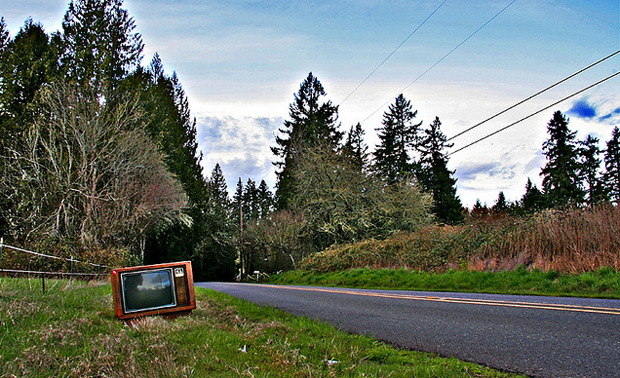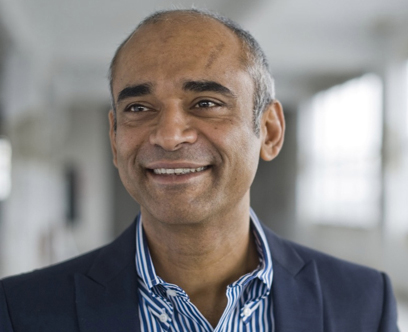We chat with Chet Kanojia of Aereo, the new TV-where-and-when-you-want-it service that has a few legal troubles. Could Aereo finally disrupt the loathed cable bundle--and TV altogether?

Chet Kanojia is the CEO of Aereo, a Barry Diller-backed, TV-in-your-browser platform that launched in mid-March in a limited New York City release. For $12 a month, Aereo allows its users to watch live broadcast TV on any Apple device of their choosing (plus Roku), in high-definition. Users can also make DVR recordings that are stored in the cloud. I’ve sampled the beautifully-designed service, whose user interface offers just about the cleanest online TV experience imaginable. For now, Aereo is limited to basic over-the-air TV: no cable options yet.
At launch, Aereo was immediately beset by legal challenges from the New York media companies whose content Aereo redistributes. (How exactly Aereo does so is fascinating, and involves lots of dime-sized antennae stored somewhere in Brooklyn.) Earlier this week, a judge dismissed one of the claims of the lawsuit, but two claims of copyright infringement remain. On Wednesday, Public Knowledge and the Electronic Frontier Foundation filed friend-of-the-court briefs arguing in Aereo’s favor. We caught up with Kanojia to talk about his disruptive technology.
FAST COMPANY: In the age of Netflix and Hulu Plus, consumers seem to expect about a $9-a-month price point for online TV. Why should they pay you $12 a month for content they could potentially get for free?

CHET KANOJIA: Simplicity and convenience. When you get it free and over the air, you don’t get a DVR, and you don’t get the ability to place-shift. You’d have to get a device like Tivo, plus a Slingbox, and it’s cumbersome and complicated. But I’d love people to do that more and more. The more people that understand that this highly compelling content is right there for free, the better it is for us. You’ve been trained by the cable companies to buy the whole thing at once, whether you watch it or not. Now it’s time to start trying to take a stand.
How did you choose the $12 price point?
Um, we made it up... That’s a half-true answer. These are early days, and we just put something out there that we would like to get some reactions to. From a value perspective, if you called a cable company today and said, “I just want over-the-air channels in HD and the ability to place-shift," it’d be $75 or more per month. Just a DVR box is $18 a month with tax. My belief on this whole thing, and it’s a subtle but important point, is that what we are doing is the dislocation of the packaging of technology with content. We’re purely technology; we’re not making you buy a package. That dislocation has a really interesting side effect, because the cost curves of technology only come down. As we drive the cost curves down, you may see us do things that are very innovative in terms of pricing.
For example?
Instead of a monthly basis, it could be based on usage. Twelve bucks a month is a starting point, while we understand what utilization patterns look like. We want to make sure people get what they pay for, rather than just some random-ass number that people make up.
You’ve been live about two months. Care to share user numbers?
We don’t release numbers, but we have a subscriber base that’s several thousand deep. And we haven’t even enabled all platforms yet. We want to come to Androids and PCs.
And geographically? Any plans to move beyond New York?
Expansion plans are a bit of a state secret around here. Mainly because they don’t really exist. Having said that, our technology is designed to be highly modular, and we could be in 50 markets if we chose to do that. But we have a diligent team, and our goal is to minimize foolishness. A lot of companies go hog wild with expansion, and they don’t understand who their customers are.
Let’s talk a bit about your legal troubles.
What I will say is this, our technology is built with three fundamental principles in mind. First, remember that Congress granted broadcasters the license to broadcast on the public airwaves in the public interest. That means all consumers have a right to access broadcast television for free using an antenna. Second, it’s well-established law that consumers are allowed to create unique recordings of that content for themselves. Remember the VCR? And lastly, the courts have allowed consumers to remotely locate that equipment for purposes of creating those individual recordings. Those are the three principles that bind Aereo and we firmly believe we fall squarely within those principles.
What’s a potential vision of the future for Aereo?
"A lot of companies go hog wild with expansion, and they don’t understand who their customers are."The dream-come-true would be to really create a parallel ecosystem in which buyers and sellers of content come together in a way that makes sense. If you get a sufficient mass of consumers on the platform, new content will emerge, programmed for them. Say I’m a new Internet-based news channel: I might price my news channel at $1.99, and users wouldn’t have to take 55 other channels to get value out of mine. Even the CEO of Time Warner Cable yesterday went on the record saying that there are too many networks, and nobody watches them all.
I think if you got HBO GO on board with Aereo as it is now, that’s all I’d need.
You’re not unique in that. The purpose of Aereo is to create a platform, that once you get to a certain size, content owners can’t ignore it, and they’re forced to come and sell to you.
Would you ever want to finance new content yourself, like Netflix?
I want to be clear in this: the goal is to create just a technology platform. We’re not a content company. That’s somebody else’s business. We are trying to decouple technology and content.
Is the goal to go as a la carte as possible? So I could just subscribe to and pay for certain shows, even within certain channels?
I can’t say what the future’s gonna be like. The baby step is to enable a la carte channel access. The goal is to break towards enough granularity that you have sufficient value in it.
If Aereo’s only legacy was to light a fire under companies that should have already been providing services like Aereo, would you be happy?
The reason for me to start Aereo was a strong personal passion for creating an alternative to the options out there today. To the extent that that happened, Aereo would be a massive success. I would contend we’ve already started the debate in a meaningful way.
This interview has been condensed and edited.
For more from the Fast Talk interview series, click here. Know someone who'd make a good Fast Talk subject? Mention it to David Zax.
Follow Fast Company on Twitter.